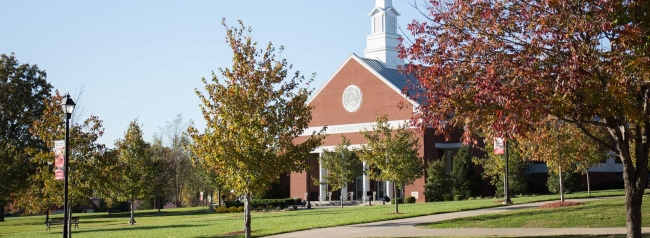You have /5 articles left.
Sign up for a free account or log in.

Campbellsville University
 Institution: Campbellsville University, a private four-year institution in Kentucky
Institution: Campbellsville University, a private four-year institution in Kentucky
Wanting More: Online learning arrived at Campbellsville in the early 2000s with a handful of courses and eventually a one-off graduate degree program in special education, funded by a grant from the state.
“For a while, it was catch as catch can,” said H. Keith Spears, vice president for communication and assistant to the president. “We had faculty who were interested; some faculty were not. We tried a few things.”
That program led to a few more. For approximately eight years, according to Shane Garrison, vice president for enrollment, the institution had roughly 200 online students at a time.
“We were trying to get in with our tiptoes, but we were definitely not diving in,” Garrison said.
Key Insights
Online programs go down smoother with skeptical faculty members when the administrator has experience on the academic side.
Build in development time for online programs that might require complex technical solutions.
Stay true to your institution's mission, but be cognizant of local and national competition.
In the middle of that period, the institution established in its 2009 strategic plan a goal of 1,000 students enrolled fully online by 2025. Seven years remain before the plan gets a refresh, but one box can already be checked: last academic year, the institution had more than 1,300 fully online students -- 75 percent from Kentucky, and the remaining 25 percent from more than 30 other states.
The Ideal Champion: Garrison has been a faculty member in the Baptist institution’s school of theology since 2008. He had pushed his school to move quickly into serving adult learners even before the strategic plan. Under Garrison’s guidance, the school rolled out a series of programs of different lengths -- one, two and four years -- with the goal of enticing students from the one-year program to continue on to the two-year program, and so forth. Garrison served as dean of theology online from 2011 until 2015.
Administrators took notice of Garrison’s efforts, hiring him in 2015 as dean of online. “They said, ‘Hey, Shane, let’s try this elsewhere,’” Garrison said.
By that point, his example was already catching on. Administrators at the business school emulated the theology school and launched their own slate of online programs. The snowball effect quickly brought other schools, like social work and music, into the fold.
“Before we knew it, we went from seven programs to 25, 25 became 30, and now we’re sitting on 39 programs,” Garrison said. “It really happened almost in an internal competitive manner.”
Garrison, who has been in his enrollment role since January 2017, declined to provide information on the institution's revenue and expenditures for online programs, saying he was not comfortable sharing those details.
Around that time, the university also entered into a partnership with Learning House, an online program management company that takes a share of the institution’s annual revenue in exchange for handling the administrative side of the online portfolio, including launching marketing campaigns and enrolling students.
That partnership helped Garrison focus on tapping in to his unique position on both sides of the fence. As an administrator who was and continues to be a professor, he believes he brings unique insight into how faculty members view online and what convinces them it’s worthwhile.
Garrison worked hard to ensure skeptics that the institution would provide instructional design and technical support “to make sure everything works.” He also adopted a policy of always saying yes to a faculty member’s proposal to go online, even it was only for a single course or part of a program.
“I was able to sell, sell, sell program development to the deans and chairs and really give them that sense of confidence in what we could deliver online in quality, in rigor, in learning outcomes,” Garrison said. “If you’re just speaking from an administrative side of the house, and you don’t have that voice in the academic side of the house, it sounds like just another administrative list of tasks.”
Pockets of Growth: Campbellsville’s online portfolio has evolved differently from what Garrison would have expected -- social work has been the most lucrative online market. That's a reminder that rigid plans for growth need to account for unexpected factors.
That policy helped build momentum at board meetings and among campus leaders. It also, occasionally, led the institution astray. Sports management has underperformed, as has music education, despite having limited competition in the state. The latter was hamstrung by a technical hiccup: Moodle, the institution’s learning management system, doesn’t support music notations, which meant instructional designers had to develop a complex solution with Moodle's developers.
The R.N. to B.S.N. nursing degree started strong but waned as that program became a foundation for many institutions’ forays into online.
Previously in "Spotlight on Innovation"
Muhlenberg College finds its online niche within the liberal arts.
Coastline Community College sees professional development as key to expanding online presence.
Garrison credits the success of the social work program in part to the university’s long-standing reputation for churning out “teachers, preachers and social workers.” Until a couple years ago, accreditors of social work programs were skeptical of online, but when policies relaxed, Campbellsville was ready to jump into the market. “We had been working a couple years in advance of that decision and had been putting a few classes online but definitely not the whole program,” Garrison said.
That program has gained such a following that advisers at bigger Kentucky institutions recommend it to their undergraduate students. “We have students who graduate from Western Kentucky in May, and they would love to start with us in May,” Garrison said. “It’s really caught fire.”
Raising the Bar: Next on the docket for Campbellsville is a textbook-free online M.B.A. that could be marketed to English-speaking foreign countries. But adequate resources have proved difficult to find. “It’s not going like we had hoped,” Garrison said.
Looking ahead, Garrison believes fully online students could constitute roughly one-quarter or even one-third of Campbellsville’s full-time enrollments. Now that the institution has blown past its initial goal for online enrollment, he thinks a figure of between 2,000 and 2,500 fully online students is within reach, though probably not much more than that.
“In comparison to some of the really big players, that’s really small,” Garrison said. “But in comparison to schools our size -- a private Christian historically liberal arts college in central Kentucky -- 2,000 online students is really tremendous.”







